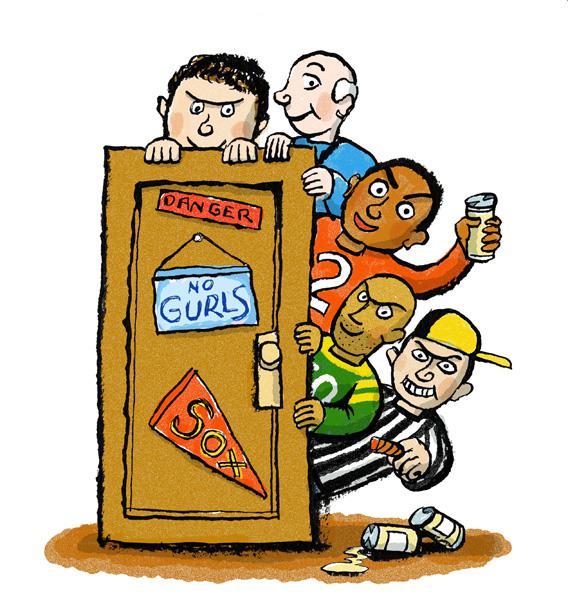“Man-Cave Masculinity: A man’s quest for his soul starts with a walk downstairs,” by Bryan Curtis. Sports, beer, and ridiculously oversized LCD televisions—the man cave and its central tenants are helping define a new culture of masculinity, Curtis writes. In the realm of the man cave, language devolves into tribal codes and women are decidedly unwelcome. But beyond the sometimes-crude behavior, Curtis says the isolated space and sense of autonomy that can accompany it should not be overlooked.
“The Man Who Invented Our World: More than anyone else, Steve Jobs shaped modern technology—and modern life,” by Farhad Manjoo. From the way we our personal computers, to the way we listen to music and use our smartphones, life without the contributions of Steve Jobs is hard to imagine. Manjoo writes in the wake of Jobs’ death Wednesday after complications with pancreatic cancer that Apple’s co-founder was invaluable for his ability to separate good ideas from groundbreaking ones. In the process, Jobs not only revolutionized the growing tech industry, but also modern life.
“The Shirt From Hell: The appalling rise of the smelly, sweaty, scratchy no-iron shirt,” by Daniel Akst. No-iron shirts—or as Ankst refers to them, “the satanic love-child of chemistry and retailing”—may save people the hassle of ironing, but that’s still no excuse. From Costco to Brooks Brothers, this ever-present fashion abomination continues to offend the sensibilities of stylish people everywhere. Regardless, men are still 11 times more likely than women to sport the awful trend.
“The Brown Peril: How contagious are bedbugs, really?” by Dave Johns and Amy L. Fairchild. From college dorms to low-income housing, conventional wisdom says no one is safe from bedbug hysteria. But are the tiny pests - whose legacy as a nuisance for homeowners and travelers dates back to the Civil War—really as tenacious as everyone says? Yes and no, Johns and Fairchild explain. Yes, bedbugs can be extremely difficult to get rid of, but they are not as contagious as media reports and pest control companies might have consumers believe.
“Stop Following Me! I’m being stalked by a man on Twitter. And it’s my dad,” by Katherine Goldstein. At first it seems sweet and wholesome when a parent makes an effort to connect with a child on social media. But it can get weird. Goldstein details her father’s foray into the Twitter universe, which consists mostly of monitoring his daughter’s every tweet. When following tweets turned into constant phone calls, however, Goldstein is forced to decide whether Twitter is worth the lack of privacy.
“Single Moms Are Crazy! Does everyone secretly think this?” by Katie Roiphe. Of course being a single mom isn’t easy, but that doesn’t make women raising their children alone crazy, Roiphe explains. Instead, she writes, a sense of romanticism among some single mothers—choosing “vividness over contentment, intensity over security”—can lead others to question the practicality of a one parent household. Despite voluminous academic studies and anecdotal evidence offered by outsiders, however, Roiphe maintains that the unexpected can enhance a child’s life.
Did Dropping Acid Make Steve Jobs More Creative? It seemed to work for William S. Burroughs and the Beatles,” by Brian Palmer. Steve Jobs is certainly not the first to suggest a link between LSD and creativity, but research about a possible correlation is still not totally clear. Studies have shown the hallucinogen might help make naturally creative people more creative, but it likely doesn’t do much for the less creatively inclined.
“The Economics of Occupy Wall Street: The protesters say the top 1 percent of Americans have gotten too rich. Are they right?” by Annie Lowrey. Occupy Wall Street protesters have still not clearly articulated the goals of their ongoing demonstrations, but they have drawn attention to economic inequality in America, Lowrey writes. And to be sure, that inequality is increasing. In the 1970s, the 99 percent earned approximately 90 percent of income. By 2008 that number had dropped to 79 percent, with the top 1 percent earning 21 percent of income.
“Sarah Palin’s Improbable Gift to Women: By choosing excessive self-confidence over undue modesty, she broke one of the final glass ceilings,” by Libby Copeland. Political policy aside, Sarah Palin’s decision this week not to run for president in 2012 just might help advance powerful women in society, Copeland writes. Despite many memorable public gaffes, Copeland says Palin’s unapologetic self-promotion and “unselfconscious brashness” could be a positive development to help recognize women’s achievements.
“Before Hitler, Who Was the Stand-In for Pure Evil? The Egyptian Pharaoh, of course,” by Brian Palmer. Country singer Hank Williams Jr. this week became the latest high profile figure to compare President Obama to Adolf Hitler, which resulted in his firing from ESPN’s Monday Night Football. Before Hitler became the go-to reference for all-encompassing evil, however, Palmer writes that the ancient Egyptian pharaoh was the favored evil allusion of reformers from Thomas Paine to Martin Luther King Jr.
